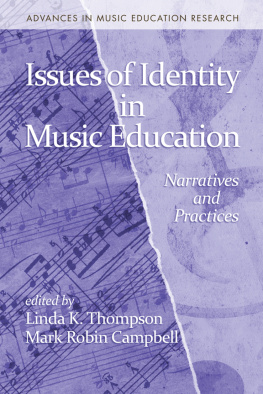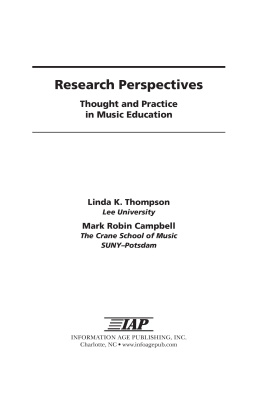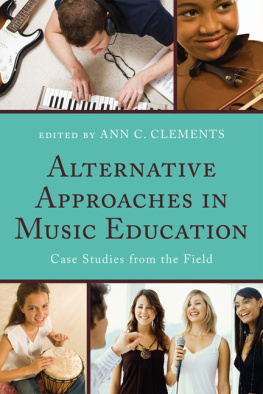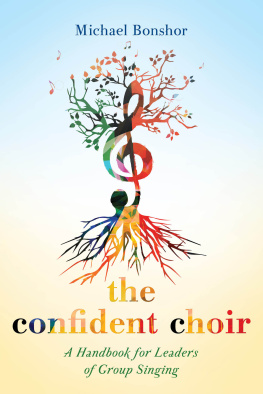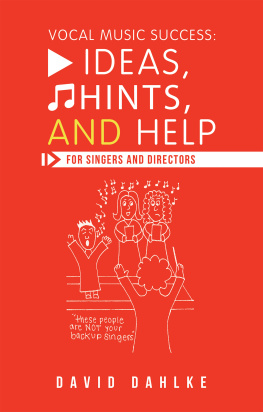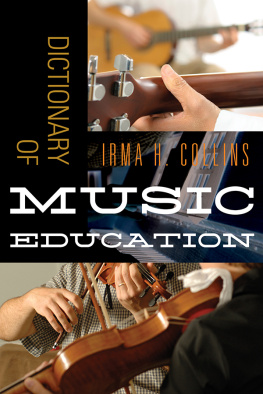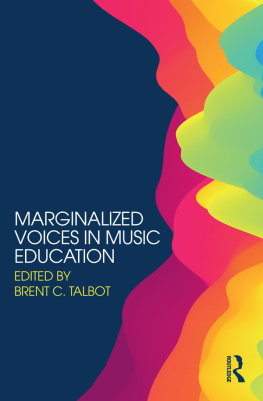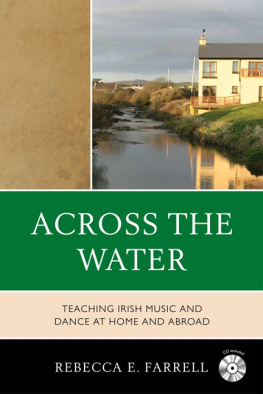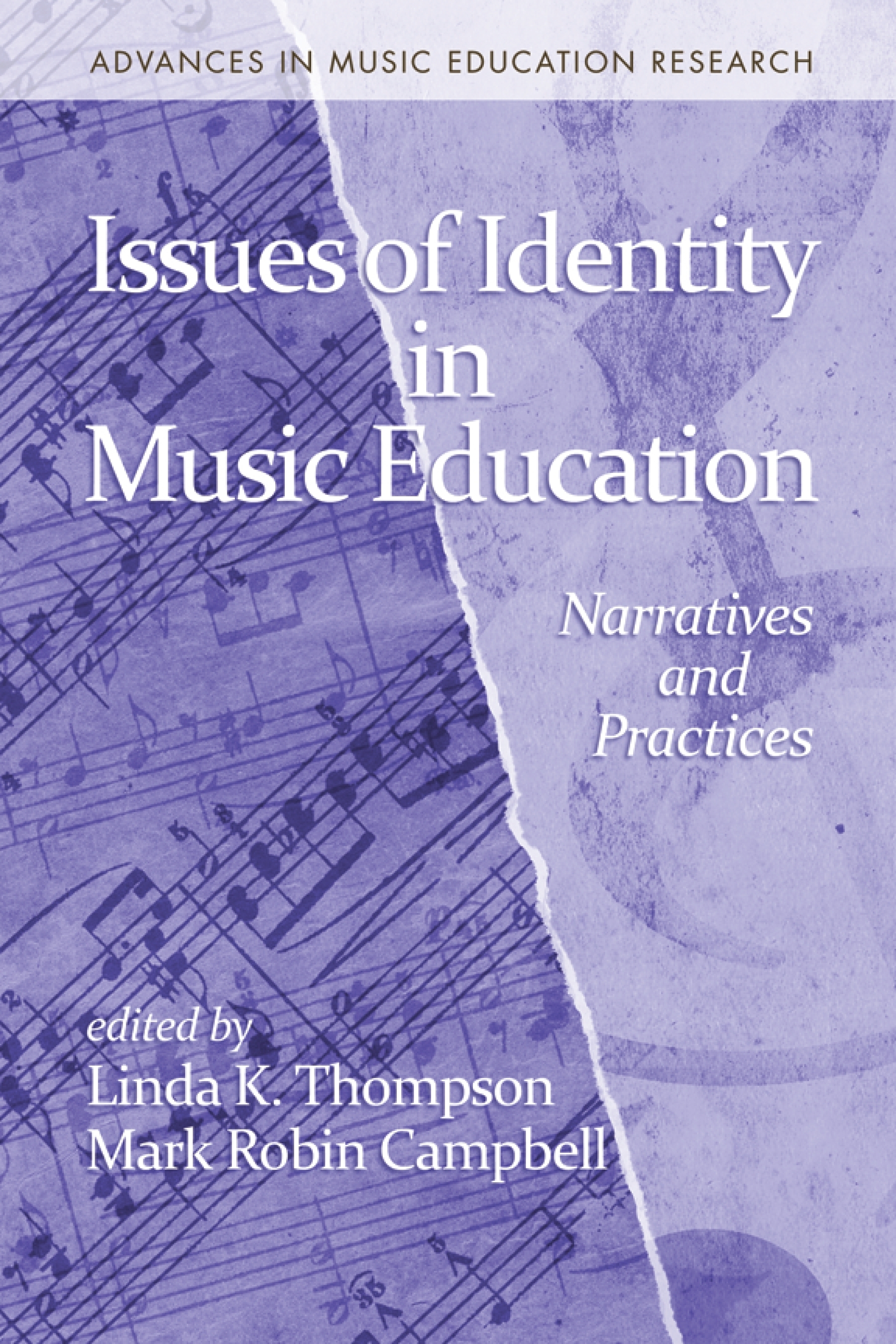ABOUT THE CONTRIBUTORS
Dale Bazan is assistant professor in music education at the University of NebraskaLincoln. Bazans research interests include adolescent learning, instrumental music education practices, student-directed instruction, and social psychology of music. He has presented at several national conferences and has been published in Contributions to Music Education and Visions of Research in Music Education.
Wesley Brewer is assistant professor of instrumental music education at Roosevelt University. He has presented at state, national, and international conferences. His current research emphasis is on role-identity development among preservice music educators, examining the positive and negative impacts of traditional undergraduate music education experiences on teacher role-identity.
Bruce Carter is assistant professor of music education at the University of Maryland, College Park. Carter teaches instrumental courses in addition to advising graduate research projects related to string pedagogy, music composition, and social justice. Carter has published numerous articles in peer-reviewed journals investigating topics of creativity, urban education, and gender inequities.
Mark Robin Campbell is associate professor of music education at The Crane School of Music, SUNY at Potsdam, where he teaches undergraduate and graduate courses in music teaching, learning, philosophy, and curriculum. His research focuses on the thinking and socialization processes of preservice music teachers. He is editor of several collections of works and is author of numerous published articles and studies.
D. Jean Clandinin is professor and Director of the Centre for Research for Teacher Education and Development at the University of Alberta. A former teacher, counselor, and psychologist, she is author or co-author of 8 books. Her latest book, with Michael Connelly, was published in 2000. She also authored two other books: the first based on her doctoral research and the second based on research from an experimental teacher education program. A 2006 book co-authored with six former students, Composing Diverse Identities: Narrative Inquiries into the Interwoven Lives of Children and Teachers , drew on several years of research with children and teachers in urban schools. The book won the 2008 Narrative SIG and the 2009 Division B Outstanding Book Award. She edited the Handbook of Narrative Inquiry: Mapping a Methodology (Sage, 2007). She is past Vice President of Division B (Curriculum Studies) of AERA, is the 1993 winner of AERAs Early Career Award, and was awarded AERAs Division B 2002 Lifetime Achievement Award. She is the 1999 winner of the Canadian Education Association Whitworth Award for educational research, a 2001 winner of the Kaplan Research Achievement Award, a 2004 Killam Scholar, and the recipient of the 2008 Beauchamp award at the University of Alberta.
Tami Draves is assistant professor of music education at the University of Arizona, where she teaches Introduction to Music Education, Band Techniques, Qualitative Research, Music and Sociology, and Psychology of Music. An active scholar, Dravess research interests include preservice music teacher education and inservice music teacher support, with particular emphases on student teaching, early field experience, and teacher identity.
Regina Murphy is senior lecturer at St Patricks College, Dublin City University, Ireland, where she teaches and directs postgraduate courses. The focus of her current research lies in the professional development needs of teachers in arts education and curriculum embodiment in music education. She currently serves as Board Member for the International Society for Music Education.
Linda Thompson is associate professor of music education at Lee University, Cleveland, TN, where she teaches undergraduate and graduate courses, including music methods, curriculum, and research. She also serves as the coordinator for the Master of MusicMusic Education program at Lee. Her research is focused on preservice teacher education, specifically preservice teacher thinking, beliefs, and socialization.
Colleen Whidden is currently teaching music performance and education courses at the University of Calgary. Her major research deals narratively with the phenomenon of the non-singer. Whidden has served at the board level for provincial music organizations, has presented at national and international conferences, and is an active choral conductor.
Peter Whiteman teaches undergraduate and graduate creative arts courses and convenes the Honours program at the Institute of Early Childhood, Macquarie University, Sydney, Australia. He has been involved in a range of research and development projects in early childhood education. With a growing interest in participatory methodologies, his research interests span early childhood music education, multiliteracies and emergent symbol systems, and reconstructed childhoods.
Issues of Identity in Music Education: Narratives and Practices focuses on the stories of individualscooperating teachers and student teachers, undergraduate composers, singers and non-singers, Hispanic and white students, and instrumental music educators. Individually and collectively, these studies tell stories about the ways that people, places, and spaces in music education interact to shape identity. Although using specific methodologies within both qualitative and quantitative traditions, collectively these studies create a kind of complementaritythe kind of inquiry symbiosis that Sandra Stauffer in Volume 2 avers we are ready to embrace in the profession.
Continuing the practice of inviting essays from prominent educators, Volume 3 presents the thinking of D. Jean Clandinin on narrative inquiry. Her essay brings both added depth and clarity in understanding the key ideas, processes, relationships, and ethics involved in narrative research. Peter Whitemans and Regina Murphys concluding essays advance the conversation on the role of discussant within the context of the Annual Meeting of the American Educational Research Association. Whiteman and Murphy share insights from their individual experiences as they describe the purposes and processes of this important role. Like the studies within this volume, these essays elucidate the various roles and identities we hold as researchers. This volume is a significant addition to the libraries of Schools of Music and Colleges of Education, as well as an important reference for music scholars and educators, researchers, and graduate students who are concerned with advancing both the scope and quality of research in the study of music teaching and learning.
About Advances in Music Education Research
Advances in Music Education Research (AMER), the official book series of the American Educational Research Association (AERA) Music Education Special Interest Group, is an edited and peer-reviewed publication whose purpose is to strengthen the research and educational base of music education. A particular emphasis of the series is the presentation of research reflecting diverse musical education settings involving students, teaching, and learning.
Titles in the series reflect the interests of the AERA Music Education Special Interest Group members and include a broad range of disciplinary and interdisciplinary subjects. Content for each volume in the series is drawn from selected conference papers or is constructed around a particular theme. Unique to the series is the inclusion of invited essays from prominent leaders in the field of education research in general and music education research in particular.

